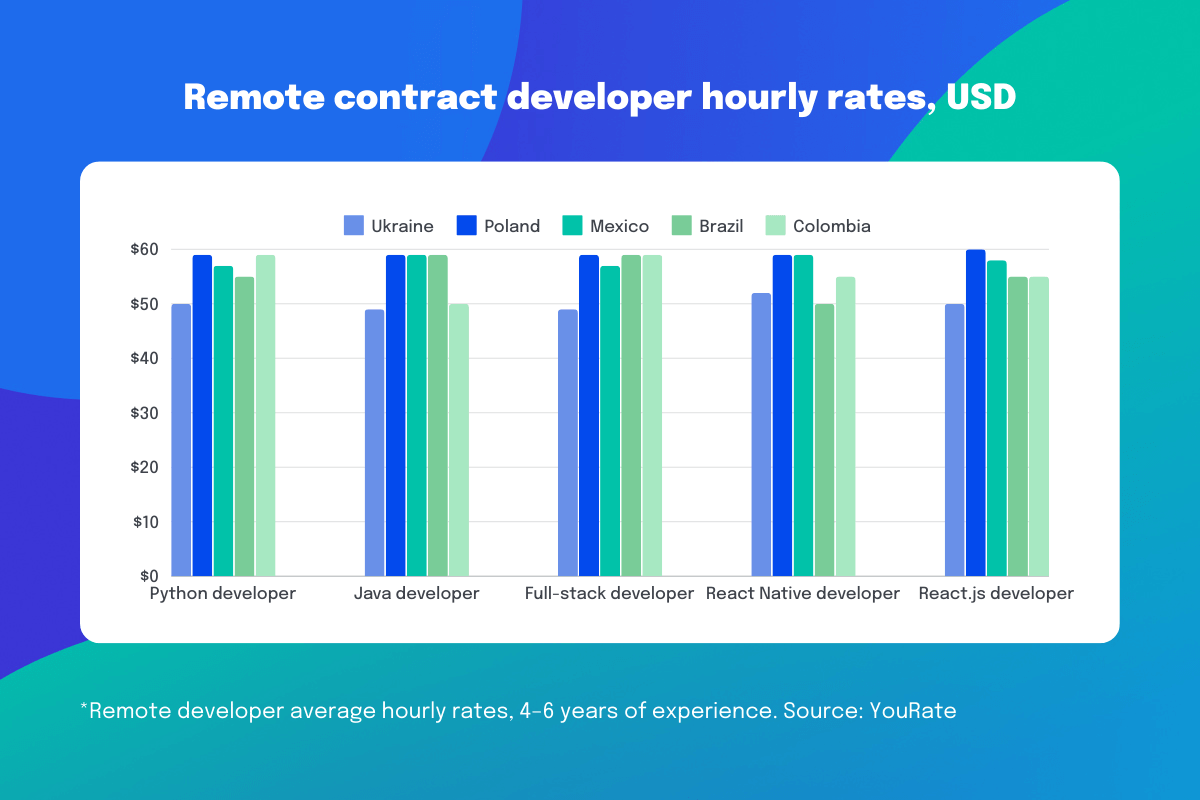As remote working becomes the new normal, tech companies and startups that were focused on in-house recruiting have changed their ways of sourcing quality tech talent and started hiring remote employees.
However, employers may face common challenges. Where to start? Where to look for quality candidates? How to choose a suitable location? Which hiring model is better for my business? If you are struggling with these questions, read on to learn some answers.
Table of Contents
How to Hire Remote Developers in 3 Simple Steps
Remote team collaboration has been all the rage recently—and the reasons are clear. Most companies go remote to combine maximum work flexibility with minimal commuting times. According to the State of Remote Work Report by Owl Labs, around 62% of employees feel productive when working remotely, which means that remote work is a viable and effective option for many workers, as well as companies.
Before you go for a remote team structure, you should decide whether you need it. Ask yourself:
- Am I able to find the best professionals in my industry locally? Or should I consider the global talent pool?
- How can I reduce my operation costs? Should I run a physical or virtual office?
- How can I boost my developers’ productivity? Shall I make the corporate culture more flexible?
If you decide to reach out to a global talent market, establish a virtual office, and build a flexible company culture—then you are ready to hire remotely. Read on—this article will guide you through each step of the hiring process for remote software engineers.
Step 1. Consider Different Hiring Options
Before you dive into headhunting, you should catch up with your existing team members and partners, discuss the ongoing and future project goals, consider budgeting constraints, and dig into both short-term and long-term goals. It will help you determine the amount of work that needs to be done by a remote team daily. This step is essential, as building the right team and delegating the tasks are keys to successful startup management.
You should decide which channels would benefit from remote team hiring. Though most companies delegate this assignment to an HR team, modern hiring platforms and communication tools may come in handy for efficient remote team management.
Besides the traditional job posting on job boards and research on LinkedIn and other social media sites, there are plenty of methods to find needed tech talent. Choose the way that works well for you, handpick the best experts available on the market, and glue them all together into one team. Or find a partner that will help you hire a remote development team with team members who have work experience on similar projects. Find the top ways to find a good fit below.
1. Ask for a referral
Did you know that job seekers in the IT sector usually switch jobs every 3–4 years? For this reason, asking your partners or colleagues for a referral is worth a try. Moreover, this helps ensure the candidate’s quality. Furthermore, you can also bring your team managers on board to facilitate collaborative hiring. Collaborative hiring helps candidates learn about the process flow at their specific department. Moreover, team managers can list the most suitable candidates to work in a specific role.
2. Attend tech conferences
Looking for a Python/Java or PHP developer? Then you should attend and monitor events like PyCon, Framework days, or Java Day.
Networking at various hackathons, conferences, and tech events will help you establish many strategic partnerships, which may turn out to be very beneficial, especially in the long run.
Plus, it’s a good source of industry insights. Are React developers still in demand? What is a PHP developer’s salary? How to manage remote developers? Conferences and meetups can give you up-to-date info on all these questions.
3. Hire remote developers on freelance platforms
If you have a short-term task or need to quickly hire a developer to complete the required tasks, hiring a freelancer is a good option. Platforms like Upwork, TopTal, and Gun.io are currently the best places to hire remote freelance software developers.
| TopTal | Upwork | Gun.io | |
| Fee | Developers’ rates already include the commission; an average rate is 120 USD. Toptal requires an initial deposit of $500 that will be applied as a credit to the first invoice once the hire is made. This deposit is refundable. | 20% fee on $0–$500 earnings;
10% fee on $500.01–$10,000 payments; 5% fee on $10,000.01+ payments. |
20% fee of developer’s monthly salary |
| Vetting | – portfolio reviews
– technical coding challenges – project management backlog grooming – formal assessments – live problem-solving sessions |
They do not vet each freelancer, but there is an option of using Talent Scout, which offers the help of the Upwork recruiter, who finds a relevant freelancer and pre-vets them to find the best matches. | – portfolio reviews
– short intro video interview with a freelancer to highlight their soft skills – WorkStyle Assessment to help articulate the different ways people approach their work |
| Time to see the candidates | 3 weeks to locate, pre-screen, and work with a developer before introducing them to a client. | With a speedy and easy hiring process, employers can start working with freelancers as soon as they find a matching candidate. | Up to 48 hours to find a freelancer for your needs |
4. Hire dedicated full-time contractors
YouTeam is a platform dedicated to expanding your engineering team with vetted full-time contractors. These specialists are employees of reliable development agencies from popular outsourcing destinations. The platform allows you to go through the hiring and onboarding processes much easier and close the skill gaps with in-demand experienced contractors within two weeks.
YouTeam’s vetting process proceeds through several stages. The platform vets software development companies and pre-interviews each candidate to make sure they match the client’s requirements.
It usually takes 48 hours to find the right candidates and send the best matches to the customer. If talking about the time needed to proceed with the interview and select the developer until signing the contract, the company may need as many as two weeks.
In addition, clients don’t need to handle financial, administrative, and legal issues—they are taken care of by a development agency. This collaboration model ensures that your remote contractors are committed to your company and project.
5. Hire outsourced developers to build your product
If you already have a project roadmap, understand what you want to develop. In that case, whether it’s a website, a mobile app, or a SaaS product, you may need to hire an entire development team to work on your software development and implement your idea from scratch.
If so, then it’s a great option for finding a reliable software company specializing in your industry and the development area you need and outsourcing the development process to professionals. To find specialized software development companies, you can take a look at Clutch.
Step 2. Build a Consistent Remote Interview Process
1. Set goals & priorities
Make sure you’re clear on exactly why you need distributed teams. Logically, in the job description, you should list which experts you need to build a remote team of developers from scratch. It is the basis your HR department or third-party marketplace will rely on to seek great candidates. Once you set precise requirements & expectations, you are all set up to make a new hire.
One of the biggest challenges in hiring remote developers is the screening process. Since people who are supposed to work remotely may be incapable of visiting your office, your interview abilities are minimal. Still, there is a sequence you can follow to determine whether the potential candidate is a good fit.
2. First screen
Zoom video calls seem the most effective of all other online interview techniques. They give you a look and feel of the person’s values. Cultural fit is key to successful remote team management.
When someone applies for a remote role at your company and seems to be a solid match, it doesn’t mean that this person is a good fit as a remote worker. In most cases, a 30-minute face-to-face call with a hiring manager or team lead can help you understand how this new employee can add value to your existing team. You can also use this remote developer interview tool for skills assessment and the candidate’s readiness to work.
Another good step is to check whether the candidate has skills and traits that distinguish them from others. Find a list of such traits to check look below.
- Prioritizing. If working remotely, this skill will help a lot when the task is still unclear. Knowing how to focus on the main functions and paying less attention to some non-urgent ones signifies the right candidate.
- Communication skills. During the workflow, the developer will surely communicate with many people, such as other developers and managers. Clear online communication is key to a successful development process with a remote team. Thus, it’s crucial to evaluate these skills in every remote employee during the interview.
- Self-discipline. This skill is essential for the developer who works remotely because working from home requires self-organization, as the success of remote work highly depends on the responsibility and time-management skills of remote employees.
In addition, the first chat is what shines a light on the remote candidate’s values. If people apply for a remote work position, they should be helpful, dedicated, and result-oriented. They also should be great at working and managing their priorities independently. Furthermore, they should have proper writing skills. Hiring remote workers with such qualities will save you much time and hassle. Therefore, you will be able to find a good fit without needing a pesky recruiter.
One more thing to pay attention to when you hire a remote development team is your candidate’s ability to work as part of a team.
3. Technical screen
Scheduling a tech interview is a must if you are looking to fill a technical remote position. Creating a short (2–4 hours) exam helps you evaluate the depth of a candidate’s technical knowledge. Once the candidate passes the exam, you may assign a trial project. It will make it easier for you to test applicants on their potential output (ex., quality of the code, analytical skills, and logical thinking).
Want to hire a remote development team? Why not give them a small team task to understand how well they complement each other?
For non-technical positions, you may find the hiring process more complex, especially if you make the selection remotely. If you are looking for a manager for your distributed team, it is essential to understand a person’s competencies. In addition, you’ll have to make sure that a candidate has a great sense of independence, collaboration, and brilliant communication skills.
4. Final interview
If both interviews were successful and you found the best talent to move forward, the next step is the final interview. It should cover the candidate’s salary expectations, working schedule, and all the benefits that come along with working at your company.
Make sure you give them an opportunity to ask questions. Also, don’t forget to ask final questions yourself, as you need to ensure that a candidate is a perfect match for your distributed team. Here are examples of some interview questions:
- Have you ever worked in a remote company/team before?
- Do you have any concerns about working remotely?
- Are you able to track your KPIs on your own?
- How collaborative and team-oriented are you?
- Are you able to meet strict deadlines, without disturbing the work-life balance?
If answers to these and any other questions are what you expected to hear, it’s time to make an offer with which your candidate will be genuinely excited. For this reason, you should discuss all the salary questions in advance. Also, you should have a clear understanding of average software development salary rates in the engineer’s region.
If you are hesitant about whether a candidate is a good fit, you can ask other companies for feedback. It is an excellent opportunity to see how it feels to work with a person you are interviewing. As you extend the job offer and discuss the details, consider emphasizing the importance of professional communication. Use HTML signature to create consistent and polished email signatures that reflect the company’s brand and enhance overall communication efficiency. No matter the position, if the candidate has made a considerable contribution to the overall team progress and you feel confident about them and their ability, then they are probably the best-suited person for the position.
5. Job offer
Though all the efforts taken before are just about to pay off, it’s too early to pop a bottle of champagne. After the final video meeting with your candidate, you should send over the official job offer along with a summary of the perks you offer. To hire a remote software engineer, you should discuss a contract with respective managers and your legal department. Then, you wait for approval from your candidate and, finally, welcome a new member to your team.
Once the contract is signed, you are all set to onboard a new remote employee. Arranging a short trip to your office is an excellent opportunity to help them further break the ice and make friends with new teammates. It is also a great way to learn about its history and values.
It is good to have a person in your in-house team who helps the remote developers get along within the working environment. Having such a person is a good idea as the new developer will surely have many questions about the company, project, or some working processes, so it will help them join the team easier.
You shouldn’t neglect their part when you hire a remote development team because it helps build company loyalty.
Browse 500+ Dev Teams Available for Hire
Step 3. Traps to Avoid & Tips to Follow
1. Management
Dealing with a remote workforce may become a challenge, especially if you have no relevant management experience. We recommend assigning this role to a colleague or an outsourcing firm specialized in remote team collaboration that knows how to manage developers for more efficient collaboration.
If these methods are not what you want, you can always control remote teams yourself. However, getting used to this management style might take some time. Even so, tons of communication, management, and online collaboration tools are out there. They will come in handy to boost your management efficiency and increase overall team productivity.
2. Communication
Time differences and language barriers are the two most common communication obstacles for remote teams. Though English remains the most popular language in the IT industry, most remote team members are not native speakers.
For this reason, it is essential to outsource a manager who will supervise your distributed team abroad. It will resolve most of your concerns and help prevent future problems.
3. Trust
The biggest fear of working with remote teams boils down to a question of trust. As a manager, how can you be sure that an hour paid is an hour worked if you have no opportunity to regularly meet your distributed teams? Unfortunately, there’s no optimal way to answer this.
If a question of trust is among the trickiest for you, you may rely on using an outsourced marketplace that may handle all management problems themselves.
How much does it cost to hire remote developers?
We have calculated average hourly rates for remote contract developers based on data collected from the YouRate hourly rates explorer.
Remote developer average hourly rates, 4–6 years of experience. Source: YouRate
| Ukraine | Poland | Mexico | Brazil | Colombia | |
| Full-stack developer | $49 | $59 | $57 | $59 | $59 |
| PHP developer | $49 | $69 | $50 | $60 | $50 |
| Python developer | $50 | $59 | $57 | $55 | $59 |
| Java developer | $49 | $59 | $59 | $59 | $50 |
| iOS developer | $59 | $59 | $59 | $79 | $59 |
| React Native developer | $52 | $59 | $59 | $50 | $55 |
| React.js developer | $50 | $60 | $58 | $55 | $55 |
We also calculated average salaries for remote developers based on data collected from Glassdoor. These figures represent the median ranges from Glassdoor’s Total Pay Estimate model and are based on salaries reported by their users.
Remote developer average annual salaries, 4–6 years of experience. Source: Glassdoor
| United States | Germany | Ukraine | Mexico | Brazil | |
| Full-stack developer | $115,000 | $76,000 | $39,000 | $50,000 | $51,000 |
| PHP developer | $119,000 | $72,000 | $34,000 | $60,000 | $58,000 |
| Python developer | $146,000 | $80,000 | $40,000 | $68,000 | $64,000 |
| Java developer | $126,000 | $78,000 | $53,000 | $75,000 | $65,000 |
| iOS developer | $138,000 | $81,000 | $42,000 | $88,000 | $101,000 |
| React Native developer | $121,000 | $84,000 | $50,000 | $54,000 | $67,000 |
| React.js developer | $143,000 | $93,000 | $66,000 | $68,000 | $66,000 |
Final tips
No matter the duration or specifics of the project, choosing the right remote software development team may be overwhelming, especially the first time. However, if you know how to organize the hiring process correctly, you can find a reliable software development partner to contribute to your project’s success in the long run. Here are some final tips that will help you to hire remote development teams and manage them effectively:
- Build a collaborative working environment with the ability to monitor team performance on the fly.
- Schedule a set of review sessions with every new team member.
- Monitor both the overall performance of the team and the individual performance of each member.
- Make sure your team has a clear understanding of your strategy and knows how to make it work.
- Keep both short-term and long-term goals clear and properly prioritized.
Hopefully, you’ll find the recommendations listed above helpful and will be happy about working with distributed teams. However, you should never forget that hiring and working with remote teams is quite a challenge. If you struggle to find a perfect match for your development team—don’t hesitate to reach out for assistance.
YouTeam is always here for you whenever you are searching for tech talent.








